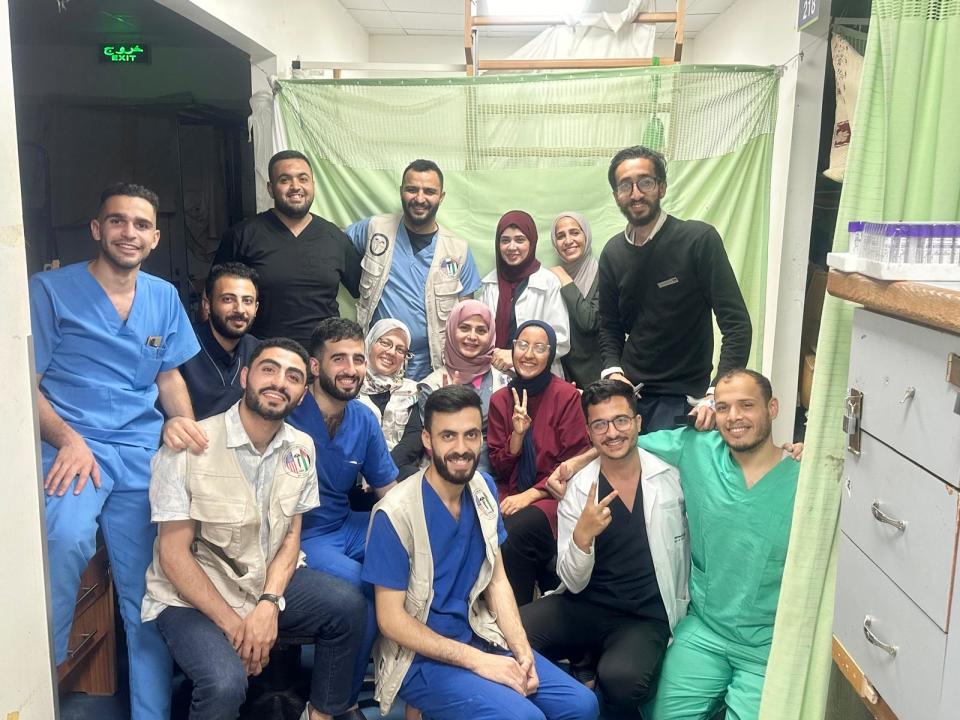New Jersey pharmacist, doctor trapped in Gaza may be able to evacuate
- Oops!Something went wrong.Please try again later.
A team of medical professionals that was trapped in Gaza may finally be able to evacuate the besieged conflict zone, said a New Jersey pharmacist serving on the team.
The 19-member team entered Gaza on May 1 to provide emergency medical aid but have been stuck there since Israel closed the border crossing into Egypt, cutting off access to humanitarian aid and medical crews.
More: American doctors trapped in Gaza begin evacuation, including NJ pharmacist and surgeon
Ghada Abukuwaik, CEO of CureMed Pharmacy, said the 10 Americans in the group were told late Thursday that they could evacuate, but they have refused to leave without their colleagues who come from other countries, including Australia and Jordan.
The team also includes Dr. Adam Hamawy, a Princeton resident who saved the life of Sen. Tammy Duckworth in 2004 in Iraq, where he served as a combat trauma surgeon in the U.S. Army.
The team traveled to Gaza on May 1 with the Palestinian American Medical Association under the umbrella of the World Health Organization. They were supposed to leave Monday and be replaced by an incoming group of aid workers.

“People here — they need the help,” Abukuwaik, of Totowa, said in an interview Thursday. “They are injured, and they are dying. We are not talking about politics. The message is that there has to be international health care provided and help for people here all the time and to have a safe place, a green zone, for these people to be helped.”
Dire conditions
Abukuwaik described dire conditions in the area around the European Gaza Hospital in Khan Younis where they are working. The hospital is near Rafah, the southern city that sheltered 1.4 million people, including many who fled bombings in other areas. Now Rafah is under attack, and many are fleeing again.
“Since we came, we hear bombing all the time. However, it started to increase in last 10 days,” said Abukuwaik, who intended to leave days before her colleagues so she could attend daughter's graduation from Rutgers University.
A family's home one minute from the hospital was just bombed, killing four children, Abukuwaik said. One of the boys had spent time with the team, she said. The children tell them that they feel safer with international workers at their side.
Abukuwaik recalled other “heartbreaking” cases, including a 10-year-old boy brought to the hospital whose family had been killed and who suffered burns on 70% of his body. She treated him like a son, she said. He died three days later.
Another time, an orphaned boy, age 8, had come looking for insulin for his 5-year-old brother, but they had none.
“You don’t have resources,” she said. “You don’t have medical equipment. You don’t have the right medication. Many medications are out of stock. Even though we brought with us many things, it went fast.”
One of the biggest needs, she said, is staff. Local staffing has been depleted, especially in recent days as many are evacuating with their families out of Rafah. Crowded in tents, poor hygiene is also fueling infectious diseases like Hepatitis A. She has seen people with worms in their skin and untreated scabies, a parasitic skin condition. Many children lack shoes.
A plea for help
In a video posted on the Palestinian American Medical Association social media pages, Hamawy described seeing a “constant stream of injured civilians” and feeling the hospital shake from repeated bombings.
“This is a scale of destruction I have never seen before,” said Hamawy, who runs a plastic surgery business in Princeton. “I’ve been in wars. I have seen combat injuries and natural disaster, but not to this scale.”
Duckworth, the Illinois Democrat, credits Hamawy with saving her life 20 years ago during the Iraq War. Hamawy provided critical care after Duckworth’s helicopter was shot down. She lost both legs and partial use of her right arm.
Duckworth wrote on X that she was “working hard to secure his group’s immediate evacuation.”
“Aid workers and innocent civilians should always be protected,” Duckworth wrote. “The Netanyahu admin must work to open the Rafah crossing, support evacuations and allow much more aid in.”
Israel's assault on Gaza has killed nearly 35,000 Palestinians and wounded nearly 80,000 people. Israel launched its offensive in response to an attack by Hamas militants on Israel on Oct. 7, killing 1,200 people and taking 250 hostages.
On May 7, Israel seized control of the Rafah crossing from Egypt. Israeli Prime Minister Benjamin Netanyahu said the capture was a step toward defeating Hamas’ military and governing capabilities. Humanitarian groups said it had crippled the flow of aid and prevented necessary travel.
The Biden Administration said it has been pressuring Israel to permit the team’s evacuation.
“We believe that there is more that can be done here, and this is just another example of why it is so crucial and important that the Rafah border crossing be open,” State Department spokesperson Vedant Patel told reporters Tuesday. “Not just for the appropriate flow of humanitarian aid, but also for the safe departure of foreign nationals.”
Hamawy, in the video posted online, also urged the international community to help end the war.
“Call your congressman,” he said. “Call the newspapers. Petition. If you are a doctor, come here. Everyone has a skill and ability. Give money to organizations like PAMA or any organization sending aid or people here to Gaza. You cannot just sit idly by and deny what is clearly happening before our eyes.”
This article originally appeared on NorthJersey.com: NJ doctor, pharmacist trapped in Gaza may be able to evacuate

